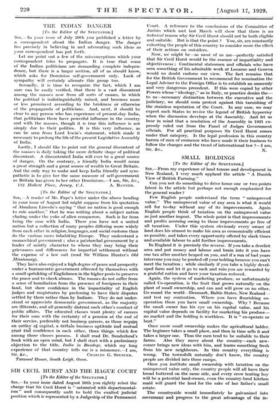[To the Editor of the SPECTATOR.] Sin,—A reader of Mr.
Pape's letter under the above heading in your issue of August 3rd might suppose from his quotation of Abraham Lincoln's saying " that no nation is good enough to rule another," that he was writing about a subject nation chafing under the yoke of alien conquerors. Such is far from being the case with India. There you have not a united nation but a collection of many peoples differing more widely from each other in religion, languages, and social customs than do the various races inhabiting Europe. They understand a monarchical government ; also a patriarchal government by a leader of saintly character to whom they may bring their grievances and differences for impartial settlement without the expense of a law suit (read Sir William Hunter's Old Missionary).
They have also enjoyed a high degree of peace and prosperity under a bureaucratic government officered by themselves with a small sprinkling of Englishmen in the higher posts to preserve the peace and to check abuses. The masses do not suffer from a sense of humiliation from the presence of foreigners in their land, but show confidence in the 'impartiality of English judges and magistrates by preferring to have their disputes settled by them rather than by Indians. They do not under- stand or appreciate democratic government, as the majority are illiterate, and all generally distrust each other's conduct of public affairs. The educated classes want plenty of careers for their sons with the certainty of a pension at the end of their service, preferably not business careers, as those require, an outlay of capital, a UeRain business aptitude and mutual trust Aha confidence in each other, three things which few among those classes possess. I shall read Dr. Sunderland's book with an open mind, but I shall start with a preliminary objection to the title, India in Bondage, which my long experience of that country tells me is a misnomer.—I am,
































 Previous page
Previous page